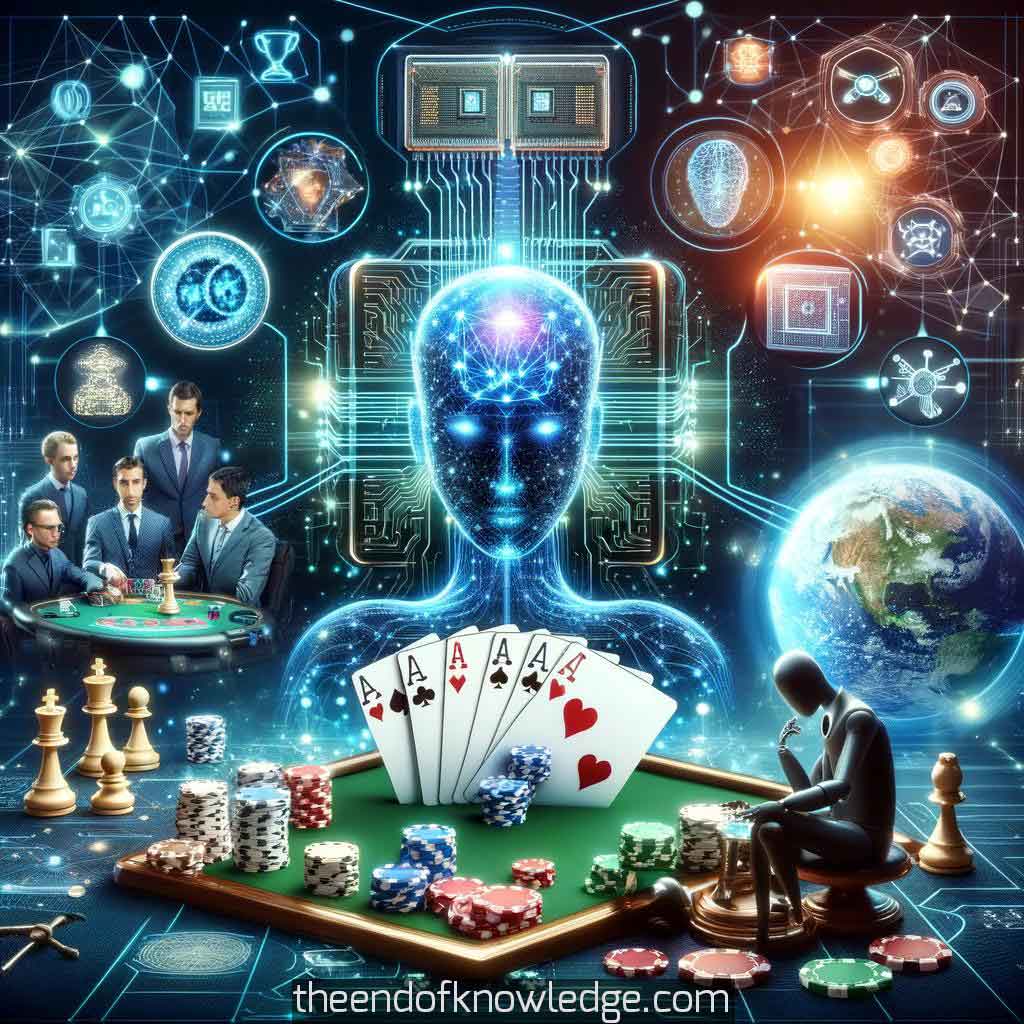 >
>
Concept Graph (using Gemini Ultra + Claude3):
Custom ChatGPT resume of the OpenAI Whisper transcription:
1.- Noam Brown, a research scientist at FAIR, co-created AI systems that excel in No Limit Texas Hold'em poker (both heads up and multiplayer) and in strategic negotiation in the game of Diplomacy.
2.- Brown's interest in poker began in high school, fascinated by the concept of an objectively correct way to play and the potential for unlimited earnings if mastered.
3.- He explains the Nash Equilibrium concept, which asserts that in finite two-player zero-sum games, there's an optimal strategy that guarantees no loss in expectation, regardless of the opponent's actions.
4.- Nash Equilibrium's relevance extends to games like chess, poker, and rock, paper, scissors, where randomization ensures no expected loss over time.
5.- Brown elaborates on the complexity of No Limit Texas Hold'em, noting its high variance and the psychological impact of large bets on players.
6.- The AI systems Brown works on, like Libratus, aim to approximate Nash Equilibrium in poker, focusing on strategy rather than exploiting human weaknesses.
7.- Brown discusses the technical aspects of AI in poker, including self-play and counterfactual regret minimization, methods that help AI learn optimal strategies.
8.- The discussion covers the role of search in AI game playing, crucial in complex games like chess, Go, and poker, and how it differs from human cognitive processes.
9.- Brown highlights the advancements in AI for poker, detailing the development of Libratus and its success against top human poker players, emphasizing the importance of balancing bluffing and betting strategies.
10.- The conversation also explores the potential future applications of AI in gaming, particularly in role-playing games and open-world games, where AI could greatly enhance player interaction and narrative depth.
11.- Brown touches on the challenges of creating AI that is not only competitive but also engaging and entertaining for human players, a significant consideration in game design.
12.- He reflects on the broader implications of AI advancements in gaming, considering how these technologies might reshape our understanding of strategy, competition, and human-machine interaction.
13.- The interview delves into the psychological aspects of poker and how AI navigates the complexities of bluffing, risk-taking, and strategic decision-making.
14.- Brown discusses the evolving landscape of professional poker, noting how AI strategies have influenced human play and the growing acceptance of game theory optimal approaches among top players.
15.- The conversation also touches on the cultural and historical significance of games like poker and chess, and how AI research in these areas intersects with broader societal trends and interests.
16.- Brown's AI research not only focuses on winning strategies but also considers the entertainment value and viewer engagement in games, recognizing the difference between an AI that wins and an AI that provides an enjoyable experience.
17.- The interview highlights the impact of AI on the perception and strategies of professional poker, with players increasingly adopting tactics learned from AI systems, like overbetting, a previously uncommon move.
18.- Brown's journey in developing successful poker-playing AI involved overcoming initial setbacks and learning from them, leading to significant improvements in algorithms and strategy.
19.- The technical aspects of AI development, such as the choice of programming languages, parallelization, and optimization challenges, are discussed, illustrating the complexity and resource-intensiveness of creating competitive AI systems.
20.- The conversation also touches on Brown's interactions with professional poker players and their varied reactions to AI, ranging from excitement to skepticism about AI's capabilities in poker.
21.- Brown reflects on the emotional and psychological aspects of competing against AI in poker, acknowledging the stress and pressure involved in such high-stakes, high-profile challenges.
22.- The evolution of poker AI is chronicled, from initial failures to groundbreaking successes, underscoring the rapid advancement and potential of AI in complex strategic games.
23.- Brown discusses the future possibilities and limitations of AI in gaming and other applications, considering how AI might further integrate into and transform various aspects of human activity.
24.- The conversation delves into the educational and training potential of AI in games, exploring how AI can serve as a tool for learning and improving human skills and strategies.
25.- Brown and the host discuss the broader philosophical and societal implications of AI advancements, contemplating the changing relationship between humans and technology.
26.- The interview explores the challenge of balancing AI's capabilities with human enjoyment and engagement, considering how to create AI that is both competitive and enjoyable to interact with.
27.- Brown's insights on the role of randomness and unpredictability in games like poker and how AI navigates these elements are shared, highlighting the sophistication of AI strategy.
28.- The discussion touches on the ethical considerations and potential consequences of AI's growing proficiency in games, considering both positive and negative implications.
29.- Brown expresses optimism about the future of AI in gaming and beyond, envisioning a world where AI enhances human experiences and capabilities.
30.- The interview concludes with reflections on the journey of AI research in gaming, celebrating the achievements while acknowledging the ongoing challenges and uncharted territories ahead.
Interview byLex Fridman| Custom GPT and Knowledge Vault built byDavid Vivancos 2024